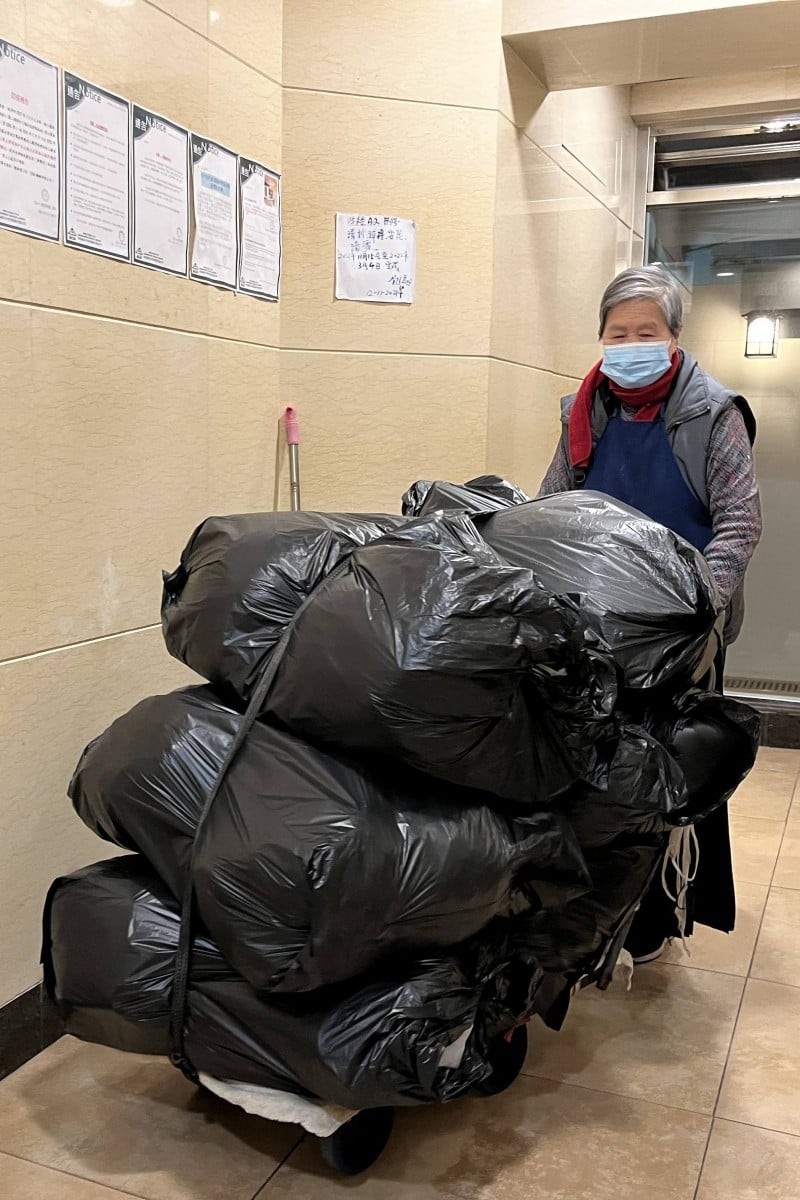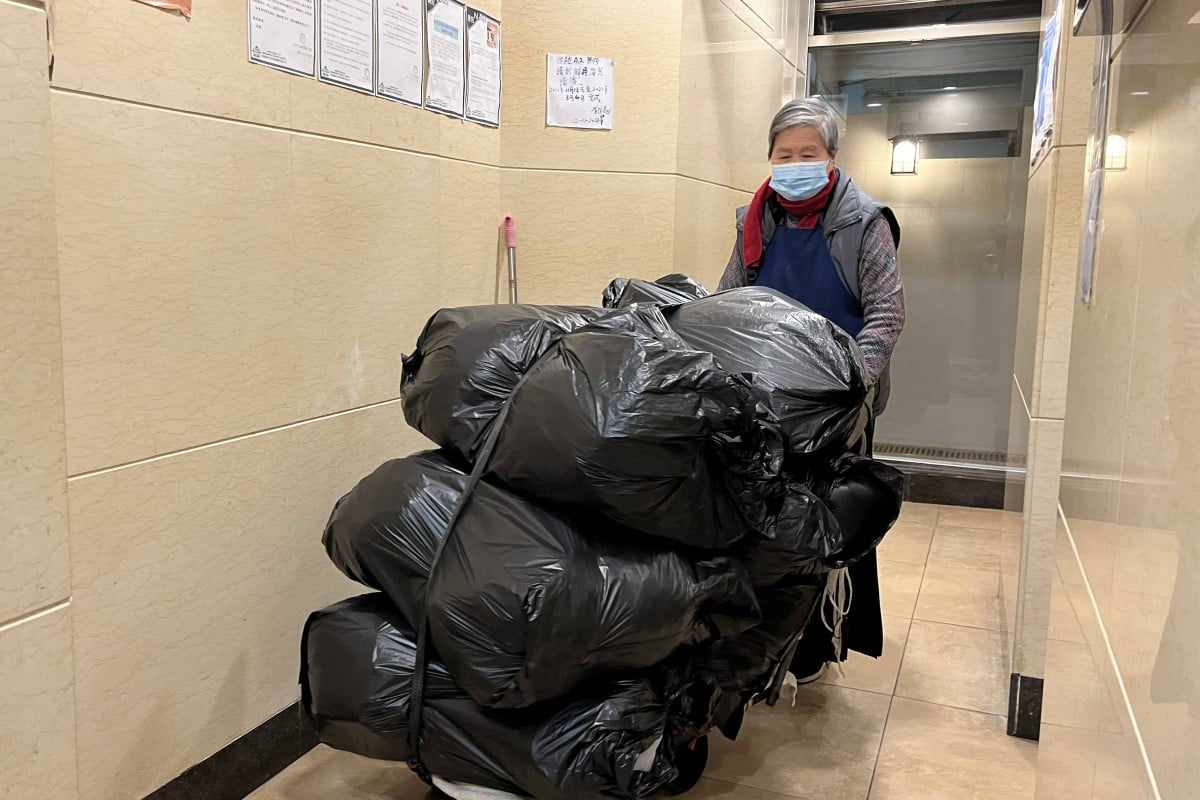
Hong Kong cleaners educate students on responsible waste disposal, from dangers of spiky durian skin to spilled soup
- Gwai* and Giu*, who work in residential buildings, say their underappreciated jobs have become even more difficult amid the city’s fifth wave of the coronavirus pandemic
- Hoping to teach pupils to be more empathetic to cleaners, the two have joined the Waste Disposal Academy, a community programme launched by a local NGO
 Gwai*, 80, has been cleaning two residential buildings in Sai Wan for the past 32 years. Photo: Kelly Fung
Gwai*, 80, has been cleaning two residential buildings in Sai Wan for the past 32 years. Photo: Kelly FungAfter finishing dinner, 80-year-old Gwai* starts her second shift of the day at 9pm, moving bag after bag of garbage in a 24-storey residential building in Sai Wan.
Gwai has worked there every day for 32 years, with no exception even during Christmas and Lunar New Year.
Now, amid Hong Kong’s fifth and worst wave of the coronavirus outbreak, her job – and that of cleaners across the city – has become even more strenuous.
Not only must she cope with more cleaning and longer hours, but there is also a chance she will need to handle waste from residents who test positive and are isolating at home – adding to her fear of catching the virus.
“There’s no use worrying. You have to do it,” Gwai said.
Hot Topics: Hong Kong’s public health care system on the brink
Even before the pandemic, her job was arduous and, at times, dangerous. Once, drain cleaner – which can severely damage the skin – had spilled on a trash bag, and Gwai was fortunate she was not hurt.
But another time, she was not so lucky, as her leg was injured by spiky durian skin when it fell from a bag.
“There are all sorts of things in rubbish bags,” she said. “People do not care about us. They just dump their trash.”
This is why – despite being exhausted by her job – Gwai signed up to be a guest speaker with the Waste Disposal Academy, a community education project launched by Caritas Mok Cheung Sui Kun Community Centre last year. The aim is to educate students about responsible rubbish disposal and raise awareness about how hard the city’s cleaners work.
In Hong Kong, most cleaners at residential buildings are self-employed and receive no cleaning supplies. They work in their own clothes and buy their own gloves, soap and bleach.
At a waste disposal seminar at Raimondi College last year, Gwai spoke about her experiences and taught pupils about how they could change their habits to be more considerate to cleaners.
Currently, Gwai works two shifts for about seven hours a day, collecting garbage and cleaning the corridors for two residential buildings in Sai Wan.
Explainer: One-fifth of Hongkongers live in poverty. Here’s what you need to know
In the past, Gwai used to take on multiple cleaning jobs, which she said was extremely taxing. Seven days a week, she would start at 6am to clean an office and would not finish her other jobs until 3am.
“[After my first shift] I would go to a dai pai dong for a bowl of congee and go home for a nap, and then I would set off to work again,” she recalled. “I was pushing myself too hard.”
“No one was available to take my son to school. That is why I turned to this job,” she said, referring to her current work in Sai Wan.
Gwai said that though her son was now grown up, cleaning residential buildings still afforded her more flexible working hours. But that did not mean every tenant was considerate when tossing rubbish.
With Hong Kong universities switching to online classes, some non-local students have been leaving the city, abandoning unwanted belongings and furniture which cleaners now have to deal with.
“It’s all over the staircase. How can one person clear all of the clutter?” Gwai lamented, adding it often took hours for her to clean up the area.
On average, the city’s cleaners earn about HK$10,000 a month. During the pandemic, most of them have not received extra pay despite having to do more cleaning.
As more people stay home and order takeaway, food and packaging waste disposal has inevitably surged.
Your Voice: Hong Kong must fix its plastic problem
“People rarely dispose of the soup from their takeaway containers, and they pour them into the trash,” said Giu*, 57, a residential building cleaner who has been working in the industry for 14 years.
“When the bag breaks, the liquid leaks all over,” added Giu, who has also signed up for the Waste Disposal Academy. “It would be easier for me if they poured the liquid into the toilet before dumping [the containers].”
For sharp objects like broken glass or durian skin that can hurt cleaners, Giu and Gwai suggested placing them in plastic or a cardboard box and writing a note to alert cleaners about what is inside.
Until recently, Giu had been working seven days a week, taking care of three tenement buildings and one residential building. But now, her daughter has stepped in to take her job temporarily so Giu can take a break.
It is not easy for cleaners to take rest days unless they are willing to pay someone else to take on their work.
“If I get paid HK$100, I will have to pay someone else HK$150 to replace me,” Giu explained.
Why a mother in subdivided flat was charged HK$4,100 for utilities bill
This is one reason cleaners receive a guest speaker fee when taking part in the Waste Disposal Academy.
“If they speak at more schools, the money can perhaps help them hire someone to replace them at work, so they can get a day off,” said Nicky Fan, 23, a social worker from the community centre who thought of the idea for the academy.
She said programme participants had even helped design stickers to tell people to pour leftover soup into the sink before tossing takeaway containers.
“If there is one person in each building who cares about the cleaners, it already makes a difference,” Fan said.
*Full names withheld at interviewees’ request.
Strenuous 費力的
Requiring or using great effort or exertion.
Discarded 扔掉
Get rid of (someone or something) as no longer useful or desirable.
Arduous 艱難的
Involving or requiring strenuous effort; difficult and tiring.
spiky 有尖刺的
Having many spikes or sharp projecting points.
Taxing 費勁的
Physically or mentally demanding.
clutter 雜物
An untidy collection of things.
inevitably 不可避免地
As is certain to happen; unavoidably.
